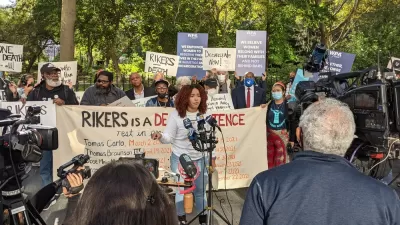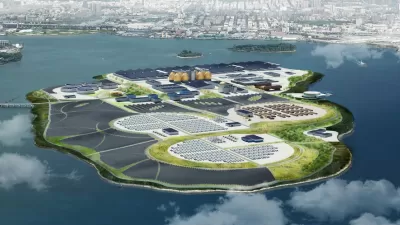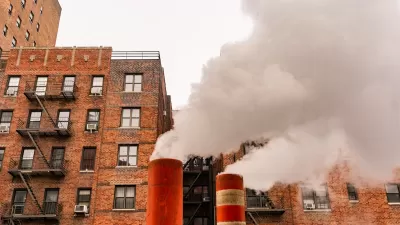With the prison complex slated to close by 2027, the city has an opportunity to transform the island into a renewable energy and research hub.

Writing in Time Out, Anna Rahmanan describes one possible future of New York’s notorious Rikers Island, which has served as a prison since 1932 and has become notorious for poor conditions and the violent treatment of prisoners. In 2019, the City Council voted to close the main prison complex, making way for new uses that could include sustainable energy and waste facilities.
“Last week, the Regional Plan Association and Rhode Island School of Design released a report based on the vision of the Renewable Rikers coalition—composed of folks that were formerly incarcerated on Rikers, plus their families and environmental and social justice groups—outlining their plans to transform the area into a green energy center.” The report proposes a research and training facility for formerly incarcerated people, a wastewater treatment plant, and recycling facilities.
According to Rahmanan, “The latter hub could potentially process over 365,000 tons of organic waste each year while also decreasing the amount of pollution currently produces by trucks on the road—that's in an of itself a huge deal.” Meanwhile, the wastewater treatment plant would replace similar facilities now located in Queens and the Bronx.
Andrea Johnson, assistant professor in the Master of Landscape Architecture program at the Rhode Island School of Design, said in a statement, “The carefully thought out designs we've presented in this report show how the entire island can be activated as an energy hub for all of New York City, while freeing large swathes of neighboring boroughs from aging energy infrastructure.”
FULL STORY: See what Rikers Island could look like when the prison complex closes

Alabama: Trump Terminates Settlements for Black Communities Harmed By Raw Sewage
Trump deemed the landmark civil rights agreement “illegal DEI and environmental justice policy.”

Study: Maui’s Plan to Convert Vacation Rentals to Long-Term Housing Could Cause Nearly $1 Billion Economic Loss
The plan would reduce visitor accommodation by 25% resulting in 1,900 jobs lost.

Planetizen Federal Action Tracker
A weekly monitor of how Trump’s orders and actions are impacting planners and planning in America.

Wind Energy on the Rise Despite Federal Policy Reversal
The Trump administration is revoking federal support for renewable energy, but demand for new projects continues unabated.

Passengers Flock to Caltrain After Electrification
The new electric trains are running faster and more reliably, leading to strong ridership growth on the Bay Area rail system.

Texas Churches Rally Behind ‘Yes in God’s Back Yard’ Legislation
Religious leaders want the state to reduce zoning regulations to streamline leasing church-owned land to housing developers.
Urban Design for Planners 1: Software Tools
This six-course series explores essential urban design concepts using open source software and equips planners with the tools they need to participate fully in the urban design process.
Planning for Universal Design
Learn the tools for implementing Universal Design in planning regulations.
Caltrans
Smith Gee Studio
Institute for Housing and Urban Development Studies (IHS)
City of Grandview
Harvard GSD Executive Education
Toledo-Lucas County Plan Commissions
Salt Lake City
NYU Wagner Graduate School of Public Service





























